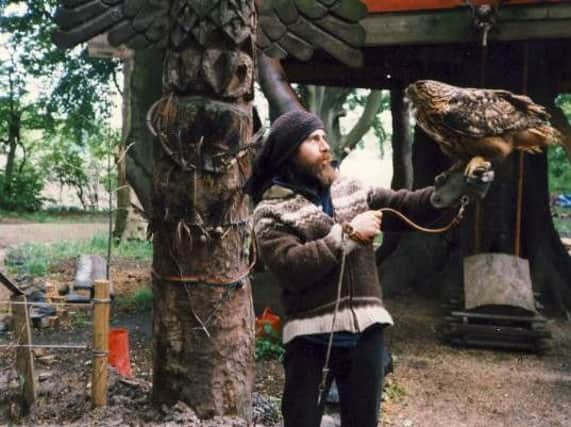Remembering Colin the Birdman of Pollok who took to the trees to save his community


Now a new documentary brings to life the remarkable and hugely touching story of Colin MacLeod, known as Colin the Birdman of Pollok, who led the protests against the M77 motorway being built through public parkland in Glasgow and whose vision changed the way a community and its people thought about itself.
Author Darren McGarvey and his aunt, former MSP Rosie McGarvey Kane, are among those who remember Macleod, who spent nine nights sleeping in a tree in protest at the road plan, in BBC Alba's Birdman of Pollok.
Advertisement
Hide AdAdvertisement
Hide AdThe documentary uses previously unseen footage of the campaigner, who died tragically young in 2005 from a heart attack, aged just 39.
Mr McGarvey said: “He was magnetic. He had those qualities that a true leader has.
Ms Kane added: "He cut such as weird figure...I've never seen a white guy with dreadlocks, for a start. And the biggest surprise is when the white dreadlocked guy opens his mouth...and he sounds exactly like me."
The film starts in the early 90s when MacLeod spent nine days up a tree in protest at plans to cut through Pollok Country Estate with the new motorway to Ayr.
As a boy, he spent many hours there with his brothers and was passionate about birds and wildlife, and sharing his knowledge with others.
When the then Strathclyde Regional Council wanted to fell some of the trees to make way for the new road, Colin took his protest into the canopy of the estate.
For nine days he lived in a tree, drawing the world's gaze onto the protest and crucially the attention of the community that had been dealt a hard hand in poverty, addiction and joblessness.
The protest camp crucially brought local people together with environmental protesters and soon the Pollok Free State was created, with passports and camp rules issued.
Advertisement
Hide AdAdvertisement
Hide AdMr McGarvey said: "There was order out of the chaos with the realisation that this was a little society and people had to come up with rules that everyone agrees with whether it was environmentalists, people from the scheme, or the young neds, for want of a better word.
"All these people were accepted there but there were implications of them all mixing."
The impact of MacLeod and the camp on the local community was immense. Children walked out of school on strike, protesters blocked roads, tens of thousands marched against the environmental impact of the plans for the new motorway.
But the motorway did go ahead with Ms Kane recalling 'a terrible day, a big funeral, a big sad bereavement' as the diggers rolled in.
Other protestors recalled smoke from burning trees belching through the park and the sound of police sirens. It was like the end of the world, one protester recalled.
Mr McGarvey recalled: "It is not the fact that the motorway ended up getting built that everyone remembers - or the fact that we lost.
"It is the feeling of connected-ness that people felt when they were down there. That is what life is all about, win or lose."
From the Pollock Free State sprang GalGael - 'the free child of Pollok Park' - a movement that used Gaelic heritage to inspire renewal in inner-city Glasgow.
Advertisement
Hide AdAdvertisement
Hide AdThe building of traditional birlinn boats became a focus for Mr MacLeod and the organisation with those suffering from addictions invited to come and learn traditional techniques and help build the once-mighty vessels of the Scottish islands.
Alastair MacIntosh, a friend and fellow campaigner who has long worked at GalGael, said: "We came to look at the boat as both a reality and as a metaphor about the journey of life
"This is where you build the courage to face life and to walk on...and then you come out to the sea into the peace of the ocean. Then you become an elder of your community, you help others to face that same pilgrimage of life."
When Mr MacLeod died aged 39 in 2005, the streets of Govan stopped, with 600 mourners behind his handmade coffin that was created by his friends at GalGael, each who took turns to carve the oak for the casket.
A service was then held for him on the Isle of Lewis, the birthplace of his father.
The documentary, made by filmmaker Nine Torrance, features interviews with his parents, brothers and children.
His mother, Josie, recalled how his friends took Mr MacLeod's phonebook following his death to try and inform all who knew him. They had to give up after three days, such was the volume of people listed.
"He was all about people, Colin. Great fellow. Wonderful. He'd give the jersey off his back. It is who he was," his mother said.
Advertisement
Hide AdAdvertisement
Hide AdHis daughter, Iona, added: "The father that I knew he didn't want to be made special, he just wanted to get stuff done and he also was always empowering and uplifting other people. We all have a part to play and we are all powerful people and if anything, that is his legacy."
--The Birdman of Pollok/ Curaidh na Coille airs on BBC ALBA on Monday 30th December at 9pm and will also be available on the BBC iPlayer.